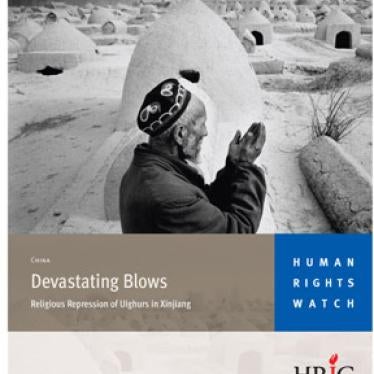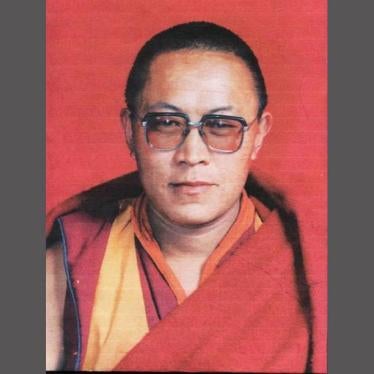Presented by Mickey Spiegel, Senior Researcher
Thank you for inviting Human Rights Watch to testify about the right to freedom of thought, conscience, religion and belief in the People’s Republic of China.
The Chinese government does not permit the continued existence of any organization or activity that has the potential to challenge the Chinese Communist Party’s control over aspects of society it deems crucial. To the extent that religious groups and organizations have an agenda different from what the Chinese government demands or organize themselves in ways that circumvent Party and government control, they face strict, and often harsh, restrictions. Human Rights Watch will briefly highlight the legal and practical machinery of the system of control, and will emphasize that controls are particularly stringent when the Chinese government views a religious activity as coinciding with, or reinforcing, problematic ethnic, cultural, and political activity.
China’s government, through a series of Party policies and government regulations, including the March 1, 2005 “Regulations on Religious Affairs,” sharply curtails both freedom of religious belief and the freedom to express one’s belief. Religious activities that are banned include publishing and distributing texts, selecting leaders, raising funds and managing finances, organizing training, inviting guests, independently scheduling meetings and choosing venues, and communicating freely with other organizations. In China today, all such activities are subject to regulatory state interference and even imprisonment and severe mistreatment of offending believers and practitioners.
Article 36 of the Chinese constitution asserts that all Chinese citizens enjoy freedom of religious belief, but the devil is in the details. The article applies only to the five religions officially recognized in China. It does not include other belief systems, nor does it include people who identify themselves as belonging to one of the recognized religions, but organize outside state control and are, thus, outlaws. A number of Catholic and Protestant groups fall outside the official state designation. Should the groups decide to abide by the regulations limiting their independence the possibility of shedding their illegal status exists. Such an option is not open to those the government classifies as “cults.”
Gaining official approval is even more limited in geographical areas, such as Tibet and Xinjiang, where official control of religion is tighter than in predominantly ethnic Chinese areas. In the Tibet Autonomous Region (TAR) and in areas in provinces with concentrated Tibetan populations, the government limits the number of monasteries, the total number of monks, and the number at any given monastery; vets all applicants wishing to join a monastery or nunnery; interferes with the independent selection of the monastic leadership at all monasteries; prohibits the performance of traditional rites; conducts ongoing re-education campaigns; limits large religious assemblies; periodically sends work teams to monasteries to check on adherence to all rules; and as Human Rights Watch has been told, “appoints paid informants in the monastery as well as villages near to the monastery to keep an eye on monks.” There is a permanent police presence in the larger monasteries. As is well known, the police will search for contraband, such as photos of the Dalai Lama or tapes of his speeches.
The political aspects of re-education, centering on opposition to the Dalai Lama, admission that Tibet has always been a part of China, and recognition of the Chinese-chosen Panchen Lama (second in importance to the Dama Lama), are well-known. China also pursues policy of denigrating and imprisoning charismatic monastic leaders and claiming for itself the right to vet all reincarnations. The case of Tenzin Delek, examined in the February 2004 Human Rights Watch report Trials of a Tibetan Monk: The Case of Tenzin Delek, clearly encapsulates these abuses.
Just two days ago, on July 19, 2005, the Chairman of the TAR, Qangba Puncog, stated that Beijing will choose the next Dalai Lama, a critical example of blatant interference with religious belief and practice.
In addition, Chinese authorities have interfered with scholarly studies of Buddhism and the transmission of Buddhist practices to an upcoming generation of students and would-be scholars and monks. Most critically, in many areas there are few, if any, master scholars and teachers, and there are restrictions on inviting monks from other areas to give teachings. In at least two areas, monks cannot go on pilgrimages outside their own region for longer than five days. As one monk reported, “The monastery is helpless, as it is the order from higher authorities.” University and public school students have told Human Rights Watch that they have barred from observing rituals and holidays, and in some cases threatened with expulsion.
The situation is much the same for the predominantly Muslim Uighur people in Xinjiang region. China limits religious practice; methodically campaigns to re-educate religious leaders; restricts publication of Uighur literature; discourages displays of religious attire or appearance, such as beards or veils, for those Uighurs holding government jobs or seeking university admittance; regulates the use of written and spoken Uighur; and discourages traditional celebratory occasions. In April 2005, Human Rights Watch released Devastating Blows: Religious Repression of Uighurs in Xinjiang, a report based on firsthand accounts and undisclosed government and Party documents. It shows beyond a doubt that religious and cultural policy in Xinjiang, as in Tibet, is carefully and deliberately crafted at the highest Party and government levels. Since the events of September 11, 2001, Beijing has suggested that its crackdown in Xinjiang is part of the “global war on terror,” erasing the distinction between small pro-independence groups who in the past espoused violence and vocal but peaceful activists.
The Chinese government also imposes the same strict limits on religious observance in Inner Mongolia, another ethnic region with a history of Chinese attempts to destroy a distinctive culture. Hada, a Mongolian who tried peacefully to lead a movement to preserve that culture is now in the tenth year of a fifteen-year prison sentence.
Against this backdrop of religious intolerance, Falungong, which refers to itself as a spiritual organization, and certain Protestant groups have fared even worse. In 1999, after listing the characteristics of so-called heretical cults, the Chinese government insisted that Falungong met the definition. The government held that Falungong represented a danger to its members and a threat to the stability of the state and subjected its leaders to criminal sanctions. Members unwilling to recant after re-education were to face trials heavily influenced, if not dictated, by Party and government authorities. The government even went so far as to forbid law firms from acting as consultants or as counsel to practitioners without first obtaining what amounted to government permission.
The ex post facto rulings cleared the way for the Ministry of Public Security and police at the provincial and local levels to arrest, detain and interrogate Falungong members and members of other so-called cults and unregistered groups. The police–– along with other agencies authorized to send people to re-education through labor camps for up to three years without trial or other judicial input–– have sent thousands of Falungong members to labor camps for periods ranging from days to years. Police often prefer re-education through labor to criminal prosecution, for a variety of reasons: for example, because evidence necessary for a judicial conviction is hard to come by or because, as in the case of Falungong, the numbers were considerable and the Party determined to quickly stamp out the perceived threat to its authority. There was hardly any time for trials, even truncated ones that came nowhere near complying with international standards of openness and fairness. In other cases, Falungong members have been forcefully sent to psychiatric institutions.
Although it is impossible to know how many people were rounded up or how they were treated, not one Falungong member should have spent one minute in detention, or for that matter, in a police van, for believing what he or she believed, or for peacefully meditating, or for practicing the variety of qigong exercises promulgated by the group. Certainly no one should have been subjected to the brutal “transformation” techniques used to re-educate them or to incarceration in psychiatric institutions.
And no member of any religious group, whether orthodox or heterodox, should be banned, persecuted, or prosecuted for its beliefs alone or for peaceful activities associated with religion or belief.
Recommendations
Human Rights Watch recommends that the U.S. government in any and all human rights dialogues and in any and all meetings of high-level U.S. officials with their Chinese counterparts urge the following:
- immediate release from any form of detention all those held for peaceful practice of activities associated with their religious beliefs. It should be noted that Chinese authorities insist that no one is incarcerated for their religious beliefs but for breaking the law. U.S. officials should urge abandonment of that fiction and seek explicit affirmation by senior Chinese government and Party officials that the independent practice of religion does not constitute a criminal act.
- cessation of the practice of using non-judicial methods to hold people for years in re-education through labor camps.
- adherence to international fair trial standards when trying those accused of crimes associated with religious practices. Permit public hearings, including attendance by foreign observers, as provided for under international human rights standards.
- permission for Falungong practitioners to resume public and private sessions.
- removal of all references to “sects” and “evil religious organizations” from the PRC Criminal Code and rescind all applicable explanations, interpretations, and decisions.
- adoption of an explicit provision guaranteeing freedom of belief for those under eighteen and the right of parents to educate their children in the belief system of their choice.
In addition Human Rights Watch urges that the U.S. government continue to resist Chinese pressure to limit the right to free assembly for religious believers or those who define themselves as spiritualists as provided for under international human rights standards.






